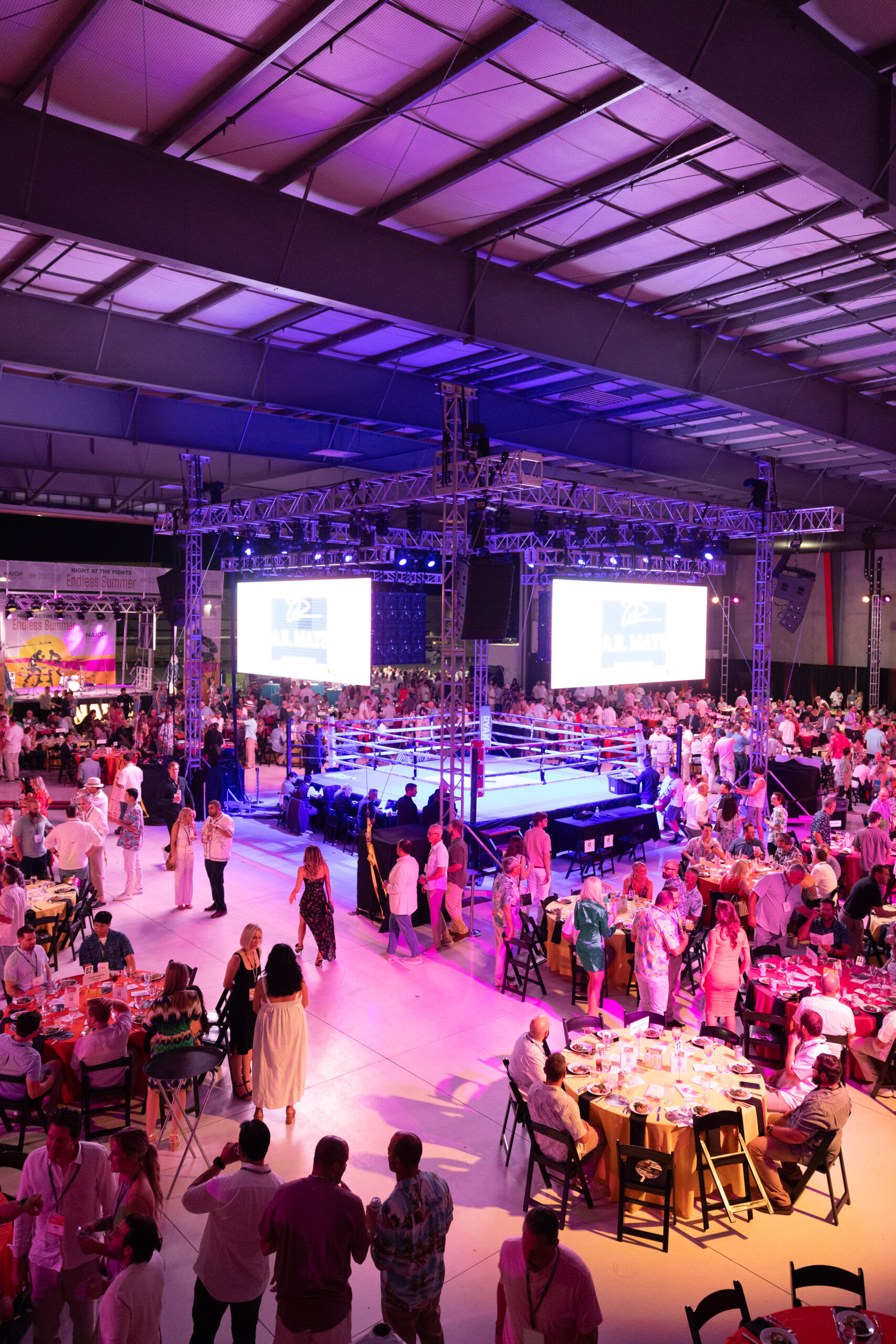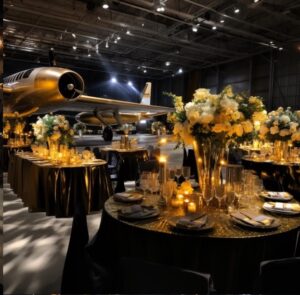Using Non-Traditional Event Venues
One of my all-time favorite assignments is to discover non-traditional event venues. The challenges and opportunities to highlight or transform these sites can be great fun. What may be another chicken dinner in a ballroom could become an event to remember for a lifetime if hosted in a unique, non-traditional setting.
I hardly recall any event hosted in a ballroom, but I remember every event ever attended in a unique venue. The gourmet dinner on the top level of a parking garage overlooking city lights; the gala hosted by candlelight in the middle of the desert under the twinkling stars of the Milky Way – yes, you could actually see the Milky Way. The awards event hosted in an industrial hangar transformed with sets from actual movies. I remember these fondly.
Let me address what in my opinion does not fit into the non-traditional venue box. Hotels and resorts, church halls, convention facilities and conferences centers, theaters, restaurants and banquet halls, and those harbor cruise boats. They are all rather traditional.
As far as non-traditional is concerned, I tend to put them into a few different categories. We have the “Attractions.” These would be botanical gardens, zoos, parks, museums, and nature settings. The second group I call “Architectural Venues,” and these are perhaps my favorite. Those include industrial spaces, hangars and empty commercial spaces, parking garages, and parking lots.
Third group are the “Retail Venues,” locations that may not traditionally be thought of as event venues. They are the retail outlets, car dealerships, art galleries; you get the idea. Each of these facilities offers wildly different opportunities and challenges for planners, but can make events an unforgettable experience for attendees.
WHAT TO LOOK FOR:
First to consider while looking for a non-traditional venue is how the venue will enhance your event goals. Hosting an event for The Nature Conservancy? Your local botanical gardens may be the perfect location. Planning a kick-off event for a high-end black-tie gala? Partnering with an upscale department store for a kick-off breakfast and fashion show may be the way to go. The possibilities are endless.
Selecting non-traditional venues does offer a unique set of challenges for planners. What about catering services, furniture rentals, accessibility, safety, restroom facilities? The list goes on.
Before starting, let’s look at what your event needs are, and how the desired venue will perform around those needs.
LOCATION SELECTION:
You must ask yourself a lot of important questions prior to finalizing your non-traditional venue selection. Traditional venues, such as resorts are mostly turn-key. They have experienced staff and most of what is needed is already on-site, or can be brought in without much fuss. I’m not saying this is always easy, but these venues offer a certain level of service, making the life of a planner mostly stress-free.
Selecting a non-traditional venue will eliminate many of these services, and planners must hire for, or manage these tasks themselves. Are you prepared to take on the additional responsibilities needed to host an event at a non-traditional location?
Some location related questions to ask:
– Is the venue easily accessible and can your attendees find it?
– Is there ample parking, do you need to offer valet parking?
– Are the roads paved or dirt? If it’s dirt, how dusty is it?
– Does the facility have power, water, and restrooms?
– Lighting? Security issues? Fire suppression?
– Is there a kitchen?
– What type of staff will be onsite pre- and during the event?
– Does the staff have experience with events?
– Can we have our event before or after hours?
– What is capacity?
– What is Plan B in case of weather?
– How do you handle waste?
– Do you have to worry about wildlife?
FOOD AND BEVERAGE:
The beauty of non-traditional venues is the opportunity to bring in your favorite caterer versus having to accept an onsite catering service. Some venues may have a preferred caterer list, but will still afford you the opportunity to bring in your own caterer and bar tenders.
Some Food and Beverage questions to ask:
– Do the onsite kitchen facilities meet the caterer’s need or do you need to bring in facilities?
– What are the policies related to serving food and beverage at the facility? Are you limited to certain locations, hours?
– What types of permits do we need to apply for? Do you need to apply for a liquor license?
STAGING:
In many cases, non-traditional venues can frame events beautifully, and little has to be done to dress-up the event. Others will require significant intervention to insure the event looks and acts the part.
A botanical garden patio may look the part simply by adding tables, linens and centerpieces. An empty industrial space will most likely require more significant effort to get the space up to par.
Some staging questions to ask:
– Can the venue support your staging needs? Do you have the power, rigging points, staging to produce your event onsite or do you have to bring it all in?
– Are there any restrictions on type of lighting, materials and set-up at the venue?
– Does the facility have tables, chairs and other equipment needed, or do you have to bring in everything?
SAFETY:
Although safety is important at all events, it may need to be considered more thoroughly at a non-traditional venue. In general such venues do not have the security staff to support an event, and it will be the planner’s responsibility to hire such staff and develop a crisis-management plan.
Some security questions to ask:
Get a good understanding from your venue contact what specific security issues may be at the venue. Is it as simple at insuring that no food and beverage is consumed in certain areas, or keeping guests from wandering off? Are there more significant issues you need to be aware of? What level of support will you need with overall event security?
Does the venue have security staff, or do you have to bring in outside security personnel? Is there a venue contact that can address security issues with the hired company?
Do you have the appropriate level of insurance coverage for your event?
Read our article about event emergencies here, and a follow-up post here.
COST:
When it comes down to it all, can you still afford the non-traditional venue? What may look like an amazing location and deal can becomes cost-prohibitive after adding in all services. Before signing on the dotted line, make sure you have a very good understanding of all costs associated with the venue and vendors you must hire in to make your event a smashing success.
HOW TO FIND NON-TRADITIONAL VENUES:
Finding your local attractions is as simple as doing an internet search or by visiting your local CVB website. Some areas also offer an Attractions Alliance. Architectural venues may take a field trip, or as I call it, a building safari. One thing in your favor is the countless available industrial or office spaces. Just call the number on the real estate sign to get the ball rolling. A conversation with a store manager can open doors for retails spaces. You could also reach out to marketing agencies and see who they represent. Agencies can connect you with client’s venues you may not have thought about.
TOP TIPS:
1. Will the non-traditional venue add or distract from your event goal?
2. Do you have the professional capacity to host your event at a non-traditional venue?
3. Consider budgetary impact.
4. Although much of the information here is cautionary, have a blast! It really is fun to work outside of the box!
Pictures courtesy of 1111 Lincoln Road. https://www.eventinterface.com/blog-article/Using-NonTraditional-Event-Venues





















